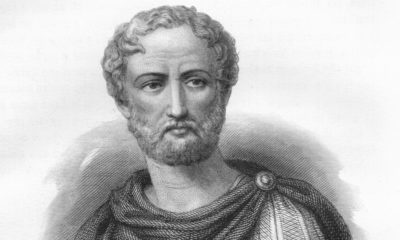In History
Emancipation Loopholes
Did Lincoln exempt Kentucky from his historic Proclamation to preserve Union supplies of hemp?
January 1st was the 150th anniversary of President Abraham Lincoln’s historic executive order now known as the “Emancipation Proclamation” – which directed the apparatus of the federal government to begin freeing slaves. It was a courageous and longsighted decision, and one which has earned Lincoln the honorific “the great Emancipator.” Today all Americans celebrate the huge step forward for the cause of freedom the Proclamation represented.
Fewer remember its loopholes, which were significant. Most glaring is the Proclamation’s exemption of slave states still loyal to the Union in 1863 (Kentucky, Maryland, Delaware, and parts of Missouri), a minor technical detail which meant that all of the slaves supposedly freed by the order were still held captive beyond the order’s jurisdiction – in states controlled by the Confederacy. Few if any slaves were actually freed 150 years ago today, even though about half a million of them lived in states loyal to Washington, D.C.
This may seem odd. Why would Lincoln write an order which only applied outside U.S. jurisdiction? In practice, the Proclamation became more of a military directive than anything else: an order to Lincoln’s generals to set free any slaves they find in enemy territory (before 1863, slaves found in Confederate territory by Union officers lived a nebulous existence between POW, freed hostage, and property held in trust). Outside of military campaigns, the order didn’t really apply.
The biggest reason for this convoluted application was the Constitution, which in 1863 remained famously silent on the issue of slavery. As President, Lincoln probably did not have the constitutional authority to abolish slavery unilaterally; even if he signed an Abolition bill passed by Congress, it wasn’t certain that the courts would let the law stand. In the absence of any guidance from the Constitution, the legal battle over who has the power to eliminate slavery could have easily dragged on for years; that is why Lincoln strongly supported the cause of a constitutional amendment, which if successful would ensure the compliance of every branch of government. In the meantime, he pragmatically limited his Proclamation to its soundest Constitutional basis: his powers as the country’s commander-in-chief of the armies.
But Lincoln had yet another reason for structuring the Emancipation Proclamation as a military order – one just as practical but less well known. Demand for hemp rope, canvas, and other useful field products spiked during the Civil War, as it has for every war in American history; and by far the biggest supplier of American hemp was the slave-powered Bluegrass region of Kentucky. Thus Kentucky’s loyalty to the Union represented a significant advantage for Lincoln and a decided disadvantage for his Confederate rivals, who had difficulty keeping their armies supplied with the hemp they needed. Abolishing slavery in Kentucky would have effectively ended the Union Army’s supply of hemp, which was a very labor-intensive crop to produce at the time. Taking a principled stand would have nullified a major advantage in battle.
So on this historic day, let us celebrate Lincoln’s idealism but also remember his pragmatism. By allowing slavery to endure in Kentucky for a few years more, he maintained a decided battlefield advantage for his troops. Armed with the Emancipation Proclamation, his successful armies were able to free more and more slaves by the day. Eventually, the 13th Amendment would be ratified, ending slavery in Kentucky and everywhere else in US jurisdiction, due in large part to Lincoln’s canny trade-offs. Sadly, the 16th president would not live to see it.





















